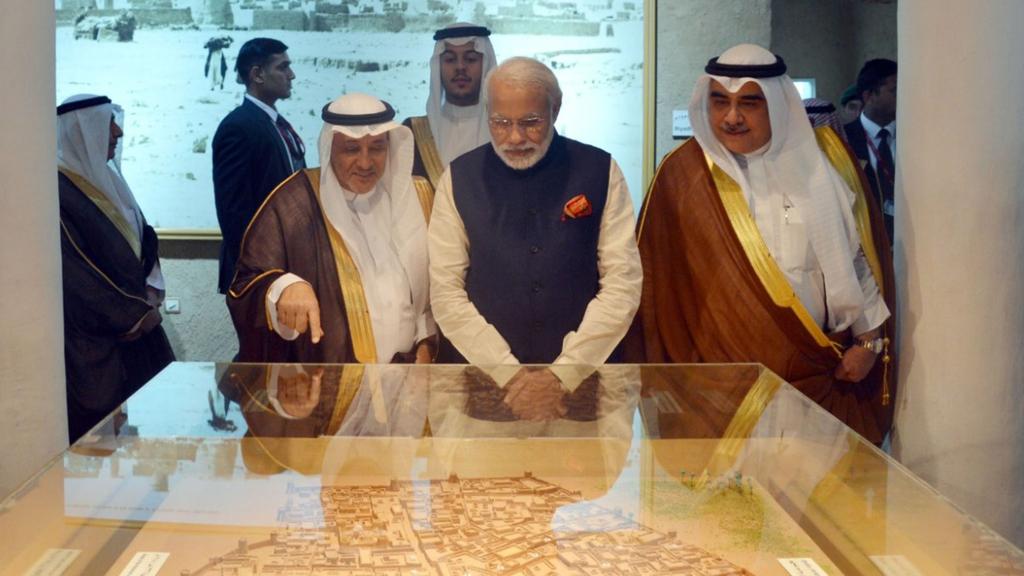Modi’s visit ushers in a new era of strategic partnership

Prime Minister Narendra Modi’s official visit to Saudi Arabia heralds a new era in Indo-Saudi relations, which over the years have developed into a strategic partnership. Modi’s visit is a follow-up to the series of high-level exchanges that began in 2006 and strengthened after King Salman’s visit to India in February 2014.
That visit was followed by Modi’s visit to Saudi Arabia in April 2016, which was in turn followed by the historic visit of Crown Prince Mohammed bin Salman to India in February 2019.
During the present visit, Modi will have bilateral discussions with King Salman and delegation-level talks with the crown prince. These discussions will be in addition to Modi delivering the keynote address at the third Future Investment Initiative (FII) forum, widely seen as the most important economic forum in the Middle East.
Modi’s visit is expected to further strengthen and expand bilateral ties in various areas such as security and strategic cooperation, defense, energy security, renewable energy, investments, trade and commerce, small and medium enterprises, agriculture, civil aviation, infrastructure, housing, financial services, training and capacity building, culture and people-to-people engagement. Nearly a dozen government-to-government agreements related to these areas are expected to be signed, as well as several government-to-business agreements.
One of the most important outcomes of the visit is expected to be the establishment of a Strategic Partnership Council (SPC) between the two countries. India will become the fourth country with which the Kingdom has formed a strategic partnership, the others being the UK, France and China.
The SPC will have two parallel tracks: Political, security, culture and society, headed by both countries’ foreign ministers; and economy and investment, headed by India’s commerce and industry minister and the Saudi energy minister.
Energy security is one of the prime areas of India’s engagement with Saudi Arabia. New Delhi appreciates the Kingdom’s vital role as a reliable source for India’s long-term energy supplies; the Kingdom supplies 18 percent of India’s crude oil requirements and 30 percent of its liquefied petroleum gas needs. Both countries are keen to transform the buyer-seller relationship in this sector into a much broader strategic partnership based on mutual complementarity and interdependence.
Saudi participation in India’s Strategic Petroleum Reserves program could further strengthen the partnership. A memorandum of understanding (MoU) between Indian Strategic Petroleum Reserves Ltd. and Saudi Aramco is expected to be finalized during the visit.
A trilateral partnership has been formed between Saudi Aramco, the Abu Dhabi National Oil Co. and a consortium of Indian oil majors. The aim is to set up the world’s largest greenfield refinery in Raigarh district on India’s west coast. The proposed 1.2-million-barrel-per-day (bpd) refinery is likely to be commissioned by 2025, and is expected to help India raise its refining capacity by 77 percent to 8.8 million bpd by 2030.
Renewable energy is another sector in which the two countries are keen to strengthen collaboration. Saudi Arabia joined the International Solar Alliance in February 2019 at India’s invitation. The Kingdom plans to generate 9.5 GW of renewable energy by 2023 under its National Renewable Energy Program. An MoU on cooperation in renewable energy is expected to be signed during the visit, which will further increase cooperation in the sector.
Defense cooperation has become robust following the signing of an MoU in February 2014. The fourth Joint Committee on Defense Cooperation between the two countries in January 2019 in Riyadh explored several new areas for cooperation.
The two sides are keen to enhance maritime security cooperation in order to ensure safe passage of international trade and crude supplies. They are also considering joint naval exercises in the first quarter of 2020.
Both countries are exploring closer cooperation in defense industries. A delegation from the General Authority of Military Industries visited India in August 2019 and held meetings with several Indian companies. Training and capacity building in the defense sector is another area of mutual interest. There has been an increase in the participation of Saudi Armed Forces personnel in Indian military courses.
Saudi Arabia and India are huge markets for the airline industry. The civil aviation authorities in both countries have agreed to progressively increase the seat capacity of their respective national carriers.
The Indian PM’s second visit to Saudi Arabia will set bilateral relations on a new upward trajectory.
Dr. Ausaf Sayeed
Saudi Arabia is India’s fourth-largest trading partner. Bilateral trade is put at $34 billion, which includes a non-oil component of $10 billion. Although trade is growing at a healthy rate of 24 percent annually, there is potential to double the non-oil component to $20 billion in the next five years.
Concerning investments, the Saudi Center for International Strategic Partnership and India’s NITI Aayog have identified 40 opportunities in which Saudi investments could be made.
The ongoing links between the National Stock Exchange of India and the Saudi Stock Exchange are an important step in integrating both countries’ capital markets.
The agreement by both countries to launch the RuPay payment gateway in the Kingdom will facilitate not only the large Indian diaspora, but also Indian tourists plus Hajj and Umrah pilgrims. The integration of India’s e-Migrate portal with the Saudi e-Thawtheeq system has been completed, and is expected to facilitate the smooth movement of workforces between the two countries.
Existing bilateral relations are firmly rooted in people-to-people contacts between the two countries. The contribution of the 2.6-million-strong Indian diaspora to the Kingdom’s development is widely acknowledged and appreciated. Modi’s second visit to the Kingdom will set bilateral relations on a new upward trajectory and bind the two nations in an even stronger strategic partnership.
- Dr. Ausaf Sayeed is India’s ambassador to Saudi Arabia. Twitter: @drausaf








































